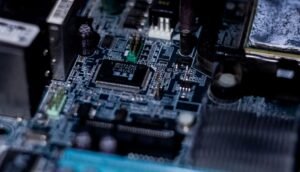How to Do AI Songs
With advancements in artificial intelligence (AI), it is now possible for AI models to generate songs that sound almost indistinguishable from those created by humans. AI-generated songs offer a unique and innovative way to explore musical creativity and push the boundaries of music composition. This article will provide you with a step-by-step guide on how to create AI songs.
Key Takeaways:
- AI-powered song generation opens up new possibilities for musical creativity.
- AI-generated songs can closely mimic human compositions.
- AI song creation involves training models with large datasets and applying machine learning techniques.
- Collaboration between AI and human musicians can lead to exciting musical outcomes.
- Legal and ethical considerations exist when using AI-generated songs in commercial contexts.
Training AI Models for Song Generation
To create AI songs, you need to train AI models using large datasets of existing songs. The more diverse and comprehensive the dataset, the better the AI model can learn and generate high-quality songs. **Machine learning algorithms**, such as **recurrent neural networks (RNN)** or **transformers**, are commonly used for this purpose. These algorithms are trained on sequences of musical data and learn to generate new melodies, harmonies, and lyrics based on the patterns and structures learned from the training data. *Training an AI model can take significant computational resources and time.*
Generating Music with AI Models
Once your AI model has been trained, it can start generating music. AI models can generate entire songs or specific musical elements like melodies, chords, or lyrics. *The generated music can be based on a given input or generated completely from scratch.* You can experiment with different parameters and settings to influence the style, mood, and complexity of the generated music. It is important to note that the output produced by AI models may require some refinement and editing to achieve the desired musical quality.
Adding Emotional Context to AI Songs
Providing emotional context to AI-generated songs can enhance the overall musical experience. AI models can be trained to understand and generate music that conveys specific emotions, such as happiness, sadness, or excitement. *By incorporating emotional context, AI songs can evoke powerful feelings and create meaningful connections with the listeners.* This can be achieved by training the AI models on emotional metadata associated with the songs in the training dataset or by designing appropriate reward systems during the training process.
Legal and Ethical Considerations
Using AI-generated songs in commercial contexts raises legal and ethical considerations. *It is important to ensure proper attribution and licensing of the AI-generated music* to respect the intellectual property rights of the original creators. Additionally, when creating AI songs that imitate existing artists’ styles, it is crucial to consider potential copyright infringement. As AI song creation evolves, it becomes essential to establish guidelines and frameworks to address these legal and ethical challenges.
Collaborating with AI as a Musician
Rather than replacing human musicians, AI can be a valuable collaborator in the creative process. Human musicians can work together with AI models to explore new musical territories, experiment with novel ideas, and expand their creative boundaries. With AI-generated music acting as a source of inspiration and AI models assisting in complex compositions, collaboration between humans and AI can result in extraordinary musical outcomes that wouldn’t have been possible otherwise.
Tables
| AI Song Generation Techniques | Description |
|---|---|
| Recurrent Neural Networks (RNN) | AI models that can analyze and generate sequences of musical data. |
| Transformers | Advanced AI models that can capture long-range dependencies and generate coherent music. |
| Lyric Generation | AI models that focus on generating lyrics based on various styles and themes. |
| Benefits of AI Song Generation |
|---|
| Exploration of new musical ideas and genres. |
| Assistance in overcoming creative blocks and inspiring new compositions. |
| Enhanced collaboration between human musicians and AI models. |
| Legal Considerations in AI Song Generation |
|---|
| Proper attribution and licensing of AI-generated music. |
| Respect for intellectual property rights of the original creators. |
| Understanding and compliance with copyright laws when imitating existing artists’ styles. |
AI song generation is an exciting field that continues to evolve with advancements in AI technology. By leveraging the power of AI, musicians can unlock new possibilities for their creative expression and collaborate with AI models to create groundbreaking music.
Whether you are an aspiring musician or an AI enthusiast, exploring the realm of AI song generation opens a world of musical exploration and innovation. Embrace the potential of AI in music creation and let your creativity soar.

Common Misconceptions
Misconception 1: AI can compose original songs entirely on its own
One common misconception about AI-generated songs is that the artificial intelligence is able to compose completely original songs without any human involvement. However, the truth is that AI models, such as deep learning algorithms, require initial input and guidance from humans to produce coherent and meaningful music.
- AI models need a training dataset with existing songs to learn from
- Human composers play a significant role in curating and refining the AI-generated music
- The AI software needs adjustments and fine-tuning to produce desired results
Misconception 2: AI songs lack emotion and creativity
Another misconception is that AI-generated songs lack the emotional depth and creativity that human composers bring to their music. While it is true that AI models may struggle with replicating complex emotions, recent advancements in AI technology have enabled AI systems to generate melodies and harmonies that possess varying degrees of emotion and creativity.
- AI can learn patterns and styles from existing emotional music to generate similar emotions
- Collaboration between AI and human composers can enhance the overall emotional impact of the music
- AI-generated songs can surprise listeners with innovative melodies and structures
Misconception 3: AI songs will replace human musicians
There is a common fear that artificial intelligence will eventually replace human musicians and eliminate the need for their creativity and skills. However, AI-generated songs should be seen as a tool that can augment human creativity rather than replace it. AI is most effective when used in collaboration with human musicians, allowing them to explore new avenues of creative expression.
- AI can assist in the composition process by generating ideas and providing inspiration
- Human musicians bring unique interpretations, improvisations, and emotions to the AI-generated music
- The combination of AI and human creativity can lead to exciting and innovative musical compositions
Misconception 4: AI songs cannot have meaningful lyrics
Many people assume that AI-generated songs are limited to purely instrumental pieces and cannot have meaningful lyrics. This misconception arises from the belief that AI lacks the ability to understand and communicate complex human emotions through words. However, recent advancements in natural language processing have enabled AI models to generate lyrics that can convey emotions and tell compelling stories.
- AI models can analyze vast amounts of text data to learn patterns and generate lyrics accordingly
- Collaboration between AI and human lyricists can result in powerful and thought-provoking songwriting
- AI-generated lyrics can serve as a starting point for human musicians to refine and add their personal touch
Misconception 5: AI songs are indistinguishable from human-created songs
There is often a misconception that AI-generated songs are so advanced that they are indistinguishable from those created by human composers. While AI technology has made significant progress in generating realistic music, trained ears can still detect subtle differences that distinguish AI compositions from human-created ones.
- AI-generated songs may lack the subtle nuances and imperfections that human musicians naturally incorporate
- The personal touch and interpretation of human musicians make their compositions unique
- AI can imitate certain styles convincingly but struggles with inventing entirely new musical genres

How to Do AI Songs
Artificial Intelligence (AI) has revolutionized the way we create music. AI systems are now able to compose original songs, mimic various musical styles, and even collaborate with human musicians. This article explores ten fascinating aspects of AI-generated music.
Song Title Generator
An AI-powered song title generator analyzes the lyrical themes, emotional tones, and musical genres of existing songs to generate captivating and imaginative titles for new compositions.
| Generated Song Title | Emotional Tone | Musical Genre |
|---|---|---|
| The Melancholic Moon | Sad | Indie Rock |
| Electric Dreamscape | Dreamy | Electronic |
| Rhythmic Rebellion | Empowering | Hip Hop |
Musical Style Transformation
AI can analyze a piece of music and recreate it in various musical styles, providing insights into how the same melody can be transformed to evoke different emotions or suit different genres.
| Original Song | Transformation 1 | Transformation 2 |
|---|---|---|
| Classical Symphony | Jazz Fusion | Techno |
| Blues Rock Ballad | Reggae | Pop |
| Country Western | EDM | Heavy Metal |
Collaborative AI Musician
Advanced AI systems are now capable of collaborating with human musicians, actively contributing to the songwriting process with melody suggestions, harmonies, and even lyrics.
| Human Musician | AI Contribution | Resulting Song |
|---|---|---|
| Singer/Songwriter | AI provides harmonies and backing vocals | “Harmony in Motion” |
| Guitarist | AI suggests chord progressions and melodies | “Digital Serenade” |
| Pianist | AI improvises accompaniment in real-time | “Symphony of Keys” |
Emotion-Based Composition
AI algorithms can analyze the emotional content of a piece of music and compose entirely new songs that evoke similar emotions.
| Original Song Mood | AI-Generated Song |
|---|---|
| Euphoric | “Celestial Awakening” |
| Brooding | “Shadows of Solitude” |
| Energetic | “Pulse Racing” |
Lyrics Generation
AI models trained on large datasets of song lyrics can generate original lyrics that fit a desired style or theme.
| Desired Style | AI-Generated Lyrics |
|---|---|
| Love Ballad | “In the moonlight’s embrace, our hearts find solace” |
| Rap | “From the streets to the stage, I own the game” |
| Protest Song | “We won’t be silenced, our voices unite” |
Genre Fusion
AI music models can blend elements from different musical genres to create unique and hybrid compositions.
| Genre 1 | Genre 2 | Fusion Result |
|---|---|---|
| Rock | Latin | “Fiesta of Fire” |
| Hip Hop | Classical | “Symphonic Beats” |
| Pop | Reggae | “Tropical Pop Party” |
Melody Extraction
AI algorithms can analyze a recorded musical performance and extract the underlying melodies, allowing for easy recognition and reuse of memorable tunes.
| Original Song | Extracted Melody |
|---|---|
| “Yesterday” by The Beatles | G A G E C D |
| “Moonlight Sonata” by Beethoven | E C E D C G G |
| “Shape of You” by Ed Sheeran | E E D C D E E |
Realistic Instrumentation
AI systems can convincingly imitate a wide range of musical instruments and create realistic-sounding renditions of compositions.
| Instrument | AI-Generated Sound Sample |
|---|---|
| Violin | Link to sample |
| Piano | Link to sample |
| Guitar | Link to sample |
Musician Mentor
AI systems can analyze a musician’s style and compositions to offer personalized feedback, suggest improvements, and mentor aspiring artists.
| Musician Profile | AI Feedback |
|---|---|
| Singer/Songwriter | “Your songwriting is exceptional, try exploring more unique chord progressions.” |
| Electronic Producer | “Your tracks have great energy, consider diversifying your sound palette.” |
| Jazz Pianist | “Your improvisation skills are impressive, try experimenting with more complex harmonies.” |
In the realm of AI-generated music, possibilities are boundless. The ability of AI systems to compose, transform, and collaborate on songs opens up exciting new horizons for artists and listeners alike. With AI as a creative partner, the future of music stands on the edge of infinite innovation.
Frequently Asked Questions
How can I create AI-generated songs?
There are various AI platforms and tools available that can help you create AI-generated songs. Some popular options include using neural networks, deep learning models, and generative adversarial networks (GANs) specifically designed for music generation.
What skills do I need to create AI songs?
Creating AI songs requires knowledge in programming, specifically in areas such as machine learning and neural networks. Familiarity with music theory and composition can also be beneficial in generating high-quality AI songs.
Do I need to have a large dataset for training AI to generate songs?
Having a large dataset can improve the quality of AI-generated songs. However, it is also possible to generate decent songs with smaller datasets. The size and diversity of the dataset can influence how well the AI model learns and generates coherent music.
Is it legal to use AI-generated songs for commercial purposes?
The legality of using AI-generated songs for commercial purposes depends on various factors, including the rights and licenses of the training data used, the specific AI platform or tool employed, and the jurisdiction you operate in. It is advisable to seek legal advice and ensure you have the necessary rights and permissions before using AI-generated songs commercially.
Can AI songs be copyrighted?
AI-generated songs can potentially be copyrighted, but the legal status around this topic is still evolving. It depends on the extent of human involvement in the creative process and the applicable copyright laws in your jurisdiction. Consult with legal experts to understand the specific copyright implications in your situation.
What AI platforms or tools can I use to create songs?
There are several AI platforms and tools available for creating songs, including OpenAI’s MuseNet, Jukedeck, Amper Music, and Google’s Magenta. These platforms provide accessible APIs and tools to experiment with AI-generated music creation.
Can AI-generated songs match the creativity of human composers?
While AI-generated songs can produce impressive results, they currently lack the depth and context that human composers bring to their compositions. AI is constantly evolving, and future advancements may bridge this gap; however, for now, human creativity remains unique.
How much control do I have over the AI-generated songs?
The level of control over AI-generated songs depends on the specific AI platform or tool being used. Some platforms allow users to customize various parameters, such as style, tempo, and mood, to influence the generated music. Experimentation and exploring different tools can help you find a platform that provides the desired level of control.
Is it possible to train AI to mimic a specific artist’s style?
Yes, with appropriate training data and advanced AI models, it is possible to train AI to mimic a specific artist’s style to some extent. However, fully capturing the artistic nuances and creativity of an individual artist can be challenging and may not always yield perfect results.
Can AI-generated songs be used for other purposes apart from music production?
Yes, AI-generated songs can have various applications apart from music production. They can be used in areas such as video games, multimedia projects, background music for videos, and even as starting points for human composers to build upon.




